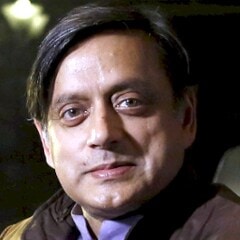Tharoor Line | Does India need a Rajya Sabha?

Mail This Article
The recent elections to 57 Rajya Sabha seats from various states once again drew attention to the Upper House of our national Parliament, described in the Constitution as the Council of States. The media has carried a number of anodyne political commentaries on the largely predictable outcomes (since Rajya Sabha MPs are elected by MLAs of their states, the number of MLAs every party has is known, and party whips are always issued, most of the winners are established in advance). But beyond the usual issues of BJP dominance, “resort politics”, a handful of errant MLAs who either spoiled their ballots or voted against their parties’ wishes, and as a result, a tiny handful of surprise results, the really interesting question about the Rajya Sabha is the nature of the institution itself.
The Rajya Sabha, it is often said, was modelled on the House of Lords, as an upper chamber that would not be elected by popular vote but consist of elder statesmen appointed on the basis of their stature and credentials.

But that was not the whole story, because it also partook of an essential feature of the Senate of the United States, which serves as a body reflecting the interests of the States in a federal polity. Yet there were key differences between the Rajya Sabha and both those foreign forerunners. Most of the British Lords were inheritors of their positions as hereditary peers of the realm; the equivalent might have been to convert our British-era Chamber of Princes into the Rajya Sabha, giving the seats to the newly-dispossessed maharajahs, nawabs and assorted princelings.
But our democratically-minded Founding Fathers and mothers balked at the idea of enshrining hereditary privilege in this way and vetoed the idea, preferring instead a Rajya Sabha elected by the state Assemblies. The US Senate ensures an equal number of Senators for each state irrespective of population, so that populous California has the same two Senators as tiny Delaware or Rhode Island. The Indian Constitution rejects that idea as well, preferring a Rajya Sabha in which larger states have more representatives than smaller ones, in keeping with their respective populations. So our Rajya Sabha cannot be said to strictly follow either model.
Still, one essential feature of other countries’ upper chambers remained – the need for a House that would serve as a Council of Elders, conducting sober reflections on legislative issues, and relatively less vulnerable to the heated political pressures of day-to-day politics that were expected to dominate the Lok Sabha, which would serve as a legislative check (a speed-breaker, as it were) on the executive. Equally, the Rajya Sabha was supposed to be the institution that reflected the states’ interests, especially in a multi-party polity where different parties might hold power in different states and the Centre.
But in the 72 years since the Constitution was adopted, none of these principles or the assumptions behind them have been fulfilled. The Rajya Sabha is clearly just as politicised as the Lok Sabha, starting from the process of elections to the disruptions and disturbances that have characterised its recent functioning. In this the Rajya Sabha has hardly been any different from the supposedly more political lower House. Its composition has long ceased to reflect the “elder statesman” tag, being indistinguishable from the Lok Sabha in many ways. The House itself has been treated as a refuge for politicians who have lost elections to the lower house, or do not want to contest since their chances of elections are uncertain. And since parties routinely nominate people not to serve as voices of their states but of their parties (often naming people of one state candidates from another), the notion of a “council of states” has long ceased to have much meaning. The constitutional requirement to even preserve the fig leaf of state loyalty by maintaining an electoral address in the state you represent was dropped in 2003, so that Rajya Sabha MPs can now “represent” states they have absolutely no connection with whatsoever. Indeed, the stances of individual MPs reflect far more their parties’ equations with the central government than the immediate interests and priorities of the states that the MPs are supposed to represent.
But in that case, why do we need a Rajya Sabha at all? This question had been debated in the Constituent Assembly, with one member, Lokenath Mishra, famously saying an upper house was not needed, since it would involve “much waste of public money and so much waste of time”. Others argued that it was undemocratic in principle for people who were not chosen by the general electorate to be eligible to serve as government ministers. Still others pointed out that it would be odd for states that themselves had only one legislative chamber to seek to reflect their interests in an upper house at the Centre. (Today, 24 states, like Kerala, have no Upper House or council; only six states have Legislative Councils.) Many held the view that a Rajya Sabha would merely be an impediment to the functioning of our democracy, rather than an asset. But they were overruled.

On the occasion of the 75th anniversary of our Independence, is it not time to revisit the functioning of our parliamentary institutions in the light of our lived experience, and study anew whether we have the kind of Rajya Sabha we need? My Lok Sabha colleague Manish Tewari even argues that bicameralism has never been found by our judiciary to be part of the “basic structure” of the Constitution. Does India, he asks, need a Rajya Sabha at all? It is a matter well worth debating.


